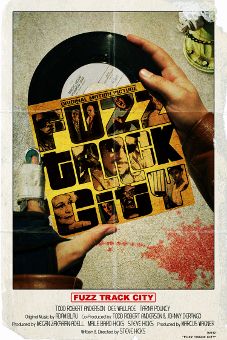IN THE GROOVE
Novelist and screenwriter Raymond Chandler said of the detective in any private-eye story, “He must be a complete man and a common man and yet an unusual man.” This goes a long way toward saying nothing, and in fact, all the detective “must be” is a cypher, a blank slate with a wisecrack for a personality, since the dick functions mostly as a mirror for the reader’s id. But this is an emblematic problem of detective fiction, in that a shamus by definition chases the action, not doing but finding out what happened. Since audience sympathy leans away from the passive character, mystery writers and filmmakers have to find solutions to keep a hold on your attention.
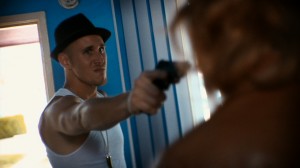 Mr Chandler’s fix, adopted by a great many hard-boiled storytellers, is to vomit superficial flair through the filter of his typewriter ribbon. It’s hard to close his novels because they’re overstuffed with similes like “as inconspicuous as a tarantula on a slice of angel food cake.” 40s films noir are loaded with such hep talk, and with a camera language typified by gimmicks: an extreme example is Robert Montgomery’s 1947 Chandler adaptation The Lady in the Lake, shot entirely in first person so that fists fly directly into the lens followed by woozy fades to black. Postmodern noir tends to wallow in sexual decadence and violence, like Dennis Hopper’s 1990 sleaze-a-thon The Hot Spot, or comment on its antecedents in the manner of 2005’s Brick, in which Rian Johnson manages to enroll every noir trope at a single high school. It’s a condition approaching irony that so many good directors come to their most beloved genre too giddy to just play it straight.
Mr Chandler’s fix, adopted by a great many hard-boiled storytellers, is to vomit superficial flair through the filter of his typewriter ribbon. It’s hard to close his novels because they’re overstuffed with similes like “as inconspicuous as a tarantula on a slice of angel food cake.” 40s films noir are loaded with such hep talk, and with a camera language typified by gimmicks: an extreme example is Robert Montgomery’s 1947 Chandler adaptation The Lady in the Lake, shot entirely in first person so that fists fly directly into the lens followed by woozy fades to black. Postmodern noir tends to wallow in sexual decadence and violence, like Dennis Hopper’s 1990 sleaze-a-thon The Hot Spot, or comment on its antecedents in the manner of 2005’s Brick, in which Rian Johnson manages to enroll every noir trope at a single high school. It’s a condition approaching irony that so many good directors come to their most beloved genre too giddy to just play it straight.
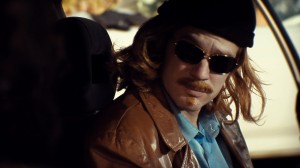 While Mr Chandler was typing labored metaphors, the more restrained Dashiell Hammett lamented of his own writing that “it is the beginning of the end when you discover you have style.” Writer/director Steve Hicks demonstrates in his neo-noir Fuzz Track City that he has that commodity in spades, and mostly in hand; the question is whether a knockout facility for visual storytelling, and an ethos that holds style at least equal to substance, will help or hinder his future as a filmmaker.
While Mr Chandler was typing labored metaphors, the more restrained Dashiell Hammett lamented of his own writing that “it is the beginning of the end when you discover you have style.” Writer/director Steve Hicks demonstrates in his neo-noir Fuzz Track City that he has that commodity in spades, and mostly in hand; the question is whether a knockout facility for visual storytelling, and an ethos that holds style at least equal to substance, will help or hinder his future as a filmmaker.
 Fuzz Track City, debuting next week at the Dances with Films festival, surprises partly because it unapologetically hugs its genre clichés without getting all mushy on them. The darkly comic story of shaggy P.I. Murphy Dunn (Todd Robert Anderson), an anachronistic loser trying to get his mojo back by tracking down the son of the guidance counselor he had a crush on twenty years ago (Dee Wallace), Fuzz explores several Los Angeles underworlds. The missing person is a record collector, so we rap about timeless ephemera with a vinyl geek (Josh Adell); against a music industry background, we party with rock stars old and new (Dave Florek and Sean Wing); since the MacGuffin is worth money and lives, we are roughed up by colorful henchmen (Josh Wingate and Jeremy Luke) and advised to lay off by bigger dicks (Matt Ashford and Kelly Van Kirk). And hey, it’s a private eye movie, so of course we leer at a dangerous beauty (Tarina Pouncy) who banters as well as she boxes, just as we place a protective arm around an out-of-her-depth ingénue (Abby Miller). Ultimately, we’re destined to meet a top predator, and when we do, it’s the terrifyingly straightforward Leon Russom, who brings to every project a touch of gravitas.
Fuzz Track City, debuting next week at the Dances with Films festival, surprises partly because it unapologetically hugs its genre clichés without getting all mushy on them. The darkly comic story of shaggy P.I. Murphy Dunn (Todd Robert Anderson), an anachronistic loser trying to get his mojo back by tracking down the son of the guidance counselor he had a crush on twenty years ago (Dee Wallace), Fuzz explores several Los Angeles underworlds. The missing person is a record collector, so we rap about timeless ephemera with a vinyl geek (Josh Adell); against a music industry background, we party with rock stars old and new (Dave Florek and Sean Wing); since the MacGuffin is worth money and lives, we are roughed up by colorful henchmen (Josh Wingate and Jeremy Luke) and advised to lay off by bigger dicks (Matt Ashford and Kelly Van Kirk). And hey, it’s a private eye movie, so of course we leer at a dangerous beauty (Tarina Pouncy) who banters as well as she boxes, just as we place a protective arm around an out-of-her-depth ingénue (Abby Miller). Ultimately, we’re destined to meet a top predator, and when we do, it’s the terrifyingly straightforward Leon Russom, who brings to every project a touch of gravitas.
Like all the best mysteries, this one hands you its secrets right away and dares you to unfold them; among these is its biggest surprise: naiveté. This, the movie says, is it. A well-plotted enigma with interesting characters, comfortable in but not overtly aware of its medium, is plenty.
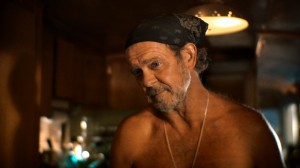 Fuzz Track City introduces a number of serious talents. Mr Anderson’s lead in some ways follows the Jeff Bridges model in The Big Lebowski, in that his character is written as a low-rent, out-of-touch bumbler. But Murphy Dunn has more of his shit together than does either of the Lebowskis, and Mr Anderson’s deliberate energy is more focused and solemn than belligerently manic. It’s easy to pal around with this lonely guy who aspires to be a lone wolf, because we understand his tough-guy mannerisms as a pose in which he’s increasingly uncomfortable. Murphy Dunn’s cool factor, therefore, is higher than he would ever guess. Ms Pouncy, easy on the eyes, also has a polite way of making herself the most interesting thing in some very interesting shots. Cinematographer Johnny Derango took those pretty pictures, describing a fusion of DP and director that promises a busy future for him. And the funk-soul band Stedapol C.C. Watt contributes four songs that should stick a pin on the music map. There’s also a great deal of vintage music you’ve probably never heard before: Nixon-era rock, twenty-odd obscure tracks playing more or less wall-to-wall; plus a very hip score by Adam Blau.
Fuzz Track City introduces a number of serious talents. Mr Anderson’s lead in some ways follows the Jeff Bridges model in The Big Lebowski, in that his character is written as a low-rent, out-of-touch bumbler. But Murphy Dunn has more of his shit together than does either of the Lebowskis, and Mr Anderson’s deliberate energy is more focused and solemn than belligerently manic. It’s easy to pal around with this lonely guy who aspires to be a lone wolf, because we understand his tough-guy mannerisms as a pose in which he’s increasingly uncomfortable. Murphy Dunn’s cool factor, therefore, is higher than he would ever guess. Ms Pouncy, easy on the eyes, also has a polite way of making herself the most interesting thing in some very interesting shots. Cinematographer Johnny Derango took those pretty pictures, describing a fusion of DP and director that promises a busy future for him. And the funk-soul band Stedapol C.C. Watt contributes four songs that should stick a pin on the music map. There’s also a great deal of vintage music you’ve probably never heard before: Nixon-era rock, twenty-odd obscure tracks playing more or less wall-to-wall; plus a very hip score by Adam Blau.
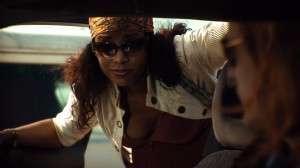 None of these finds is more fascinating than the central figure of Mr Hicks. He even wrote the most exciting song himself, and its chunky guitar riff (played with arena arrogance by Nick Maybury), but that’s just one of his accomplishments in this very personal popcorn movie. Many thrillers a hundred times as expensive make half as much sense, and look and sound no better. Depressingly few are about anything other than their story. But this one uses multiple platforms (that song is one) to investigate a serious theme.
None of these finds is more fascinating than the central figure of Mr Hicks. He even wrote the most exciting song himself, and its chunky guitar riff (played with arena arrogance by Nick Maybury), but that’s just one of his accomplishments in this very personal popcorn movie. Many thrillers a hundred times as expensive make half as much sense, and look and sound no better. Depressingly few are about anything other than their story. But this one uses multiple platforms (that song is one) to investigate a serious theme.
 Essentially about a throwback trying to approximate himself in modern idiom, Fuzz Track City makes the seminal romantic-quest inquiry: Does what we want define who we are? To pose the question, Mr Hicks reinvents one of the most over-shot locations on earth, the uber-prosaic San Fernando Valley fetishized by his protagonist, filming it with a blown-out glamor usually reserved for Cannes or the Vegas Strip. His senses of frame and of frame progression organically inform his narrative, compelling the eye like a pinball around the ramps of story. The fact that he’s the editor as well as a producer too, though, are factors contributing to the movie’s only real flaw. Like many early-auteur projects, this one takes a couple of running starts before getting off the ground with the credits; later, Mr Hicks’s photographic phrasemaking once or twice hijacks the pacing of his intricate and ultimately satisfying plot. A painter’s love for his model is forgivable and maybe even necessary, but he must resist an affair with his brush strokes.
Essentially about a throwback trying to approximate himself in modern idiom, Fuzz Track City makes the seminal romantic-quest inquiry: Does what we want define who we are? To pose the question, Mr Hicks reinvents one of the most over-shot locations on earth, the uber-prosaic San Fernando Valley fetishized by his protagonist, filming it with a blown-out glamor usually reserved for Cannes or the Vegas Strip. His senses of frame and of frame progression organically inform his narrative, compelling the eye like a pinball around the ramps of story. The fact that he’s the editor as well as a producer too, though, are factors contributing to the movie’s only real flaw. Like many early-auteur projects, this one takes a couple of running starts before getting off the ground with the credits; later, Mr Hicks’s photographic phrasemaking once or twice hijacks the pacing of his intricate and ultimately satisfying plot. A painter’s love for his model is forgivable and maybe even necessary, but he must resist an affair with his brush strokes.
 It’s an isolated issue, though; mostly the style is pleasantly gratuitous but not extraneous, establishing a remarkably competent claim on one’s attention. If that sounds like faint praise, ask yourself how many first features don’t contain a single bad performance in twenty speaking parts? How many microbudgets shoot beautiful footage in over thirty locations? And how many festival comedies make you laugh even once? This is funny when it’s supposed to be, and sad, and sexy and scary. It’s a real movie; not a calling card, or an exercise. A movie.
It’s an isolated issue, though; mostly the style is pleasantly gratuitous but not extraneous, establishing a remarkably competent claim on one’s attention. If that sounds like faint praise, ask yourself how many first features don’t contain a single bad performance in twenty speaking parts? How many microbudgets shoot beautiful footage in over thirty locations? And how many festival comedies make you laugh even once? This is funny when it’s supposed to be, and sad, and sexy and scary. It’s a real movie; not a calling card, or an exercise. A movie.
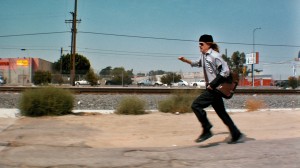 Steve Hicks is about to get popular, because of both Fuzz Track City and his documentary Finding Bryon, an Audience Award winner at Dances with Films 2005 that is certain now to get a new look. The probability is that he will soon get hired to direct something he doesn’t love, that he won’t produce or have full control of. As depressing as that likely sounds to him, learning to compromise with a boss who yells at him and denies his vision would be the best thing that could happen to his career and chops. Artistic maturity in a collaborative medium comes from placing your intention in context of a larger purpose never exclusively your own, even (and especially) when the motive spark is yours. So, let us wish upon Mr Hicks a Roger Corman. In the meantime, his picture speaks eloquently on behalf of the Don’t Wait ethic it espouses.
Steve Hicks is about to get popular, because of both Fuzz Track City and his documentary Finding Bryon, an Audience Award winner at Dances with Films 2005 that is certain now to get a new look. The probability is that he will soon get hired to direct something he doesn’t love, that he won’t produce or have full control of. As depressing as that likely sounds to him, learning to compromise with a boss who yells at him and denies his vision would be the best thing that could happen to his career and chops. Artistic maturity in a collaborative medium comes from placing your intention in context of a larger purpose never exclusively your own, even (and especially) when the motive spark is yours. So, let us wish upon Mr Hicks a Roger Corman. In the meantime, his picture speaks eloquently on behalf of the Don’t Wait ethic it espouses.
Fuzz Track City
Dances with Films selection
screening Monday, June 4 at Mann’s Chinese Theater
for tickets and information, visit http://www.danceswithfilms.com/slate_fuzztrackcity.html
